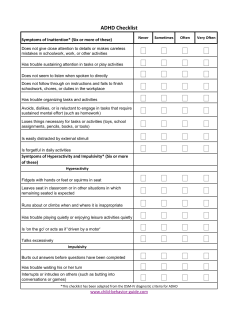
Lifestyle Redesign ® for Young Adults with ADHD
Lifestyle Redesign ® for Young Adults with ADHD: Providing Occupational Therapy Support Services in Higher Education by Carlin Daley, OTD, OTR/L, M.A.Ed. Assistant Professor of Clinical Occupational Therapy USC Chan Division of Occupational Science & Occupational Therapy carlinld@chan.usc.edu What is Lifestyle Redesign? Lifestyle Redesign® is an innovative occupational therapy approach that emphasizes the acquisition of health-‐promoting daily habits and routines.1 Lifestyle Redesign® interventions can help young adults maximize involvement in college life while balancing academic demands, extracurricular commitments, social participation, and self care. The Role of OT in Higher Education ² While much attention is paid to the impact of ADHD on children, less emphasis has been placed on the impact of ADHD into adulthood, specifically for the population of young adults transitioning into college. 3,4,5,6,7,9 ² Roughly 25% of college students with disabilities are diagnosed with ADHD. 3 ² ADHD can lead to impairments in major life domains including academic, social, extra-‐curricular, and career. 3,4,6,7,9 ² Decreased external structure, decreased parental supervision, and high levels of distraction in the college environment can add to the challenges for this population. 4,6,7,10 ² “Supporting healthy daily life behavior is a key target of effective intervention with this population” (Fleming & McMahon, 2000, p. 320) ² The USC Occupational Therapy Faculty Practice and USC Disability Services & Programs provide OT services to college students with disabilities through the utilization of a Lifestyle Redesign® approach. The Impact of ADHD in College Young adults diagnosed with ADHD may experience the following challenges: ² Decreased academic performance and greater likelihood of being on academic probation.2,3,4,5,8 ² Lower levels of self-‐esteem.7,8,9 ² Difficulties accessing social support, poorer social skills, and challenges with overall social adjustment.2,3,4,7,8,9 ² Difficulties monitoring personal stress levels.4 ² Poor concentration, motivation, time management, planning, organization, and study skills.3,4,6 ² Unhealthy sleep patterns. 4,6 ² Increased health risk behaviors including tobacco use, alcohol use, and illicit drug use.4,6 Key Topics Addressed within Lifestyle Redesign® Interventions Topic Description Stress Management Understand stress symptoms and stress coping strategies. Practice mindfulness, meditation, and relaxation strategies. Healthy Self Care Establish consistent patterns of healthy eating, physical activity, and sleep. Discuss medication management. Time Management Participate in a process of organizing, prioritizing, and planning academic and social demands. Identify procrastination patterns. Focus Learn how to minimize environmental distractions and build a schedule to optimize productivity and focus. Lifestyle Balance Find a balance of academic and extra-‐curricular involvement. Participate in meaningful activities. Social Connections Problem solve interpersonal interactions in and outside of class. Practice assertive and effective communication skills. References 1. Clark, F., Azen, S.P., Zemke, R., Jackson, J., Carlson, M., Mandel, D., et al. (1997). Occupational therapy for independent-‐living older adults: A randomized controlled trial. Journal of the American Medical Association, 278, 1321-‐1326. 2. Costello, C. A. & Stone, S. L. M. (2012). Positive psychology and self-‐efficacy: Potential benefits for college students with attention deficit hyperactivity disorder and learning disabilities. Journal of Postsecondary Education and Disability, 25(2), 119-‐129. 3. DuPaul, G. J., Weyandt, L. L., O’Dell, S. M., & Varejao, M. (2009). College students with ADHD: Current status and future directions. Journal of Attention Disorders, 13(3), 234-‐250. 4. Fleming, A.P. & McMahon, R.J. (2012). Developmental context and treatment principles for ADHD among college students. Clinical Child and Family Psychology Review, 15(4), 303-‐329. 5. Heiligenstein, E., Guenther, G., Levy, A., Savino, F., & Fulwiler, J. (1999). Psychological and academic functioning in college students with attention deficit hyperactivity disorder. Journal of American College Health, 47(4), 181-‐185. 6. Meaux, J.B., Green, A., & Broussard, L. (2009). ADHD in the college student: a block in the road. Journal of Psychiatric and Mental Health Nursing, 16(3), 218-‐256. 7. Norwalk, K., Norvilitis, J.M., & MacLean, M.G. (2009). ADHD Symptomatology and its relationship to factors associated with college adjustment. Journal of Attention Disorders, 13(3), 251-‐258. 8. Rabiner, D.L., Anastopoulos, A.D., Costello, J., Hoyle, R.H. , & Swartzwelder, H.S. (2008). Adjustment to college in students with ADHD. Journal of Attention Disorders, 11(6), 689-‐699. 9. Shaw-‐Zirt, B., Popali-‐Lehane, L., Chaplin, W., & Bergman, A. (2005). Adjustment, social skills, and self-‐esteem in college students with symptoms of ADHD. Journal of Attention Disorders, 8(3), 109-‐120. 10. Swartz, S. L., Prevatt, F., & Proctor, B. E. (2005). A coaching intervention for college students with attention deficit/hyperactivity disorder. Psychology in the Schools, 42(6), 647 – 656.
© Copyright 2025





















